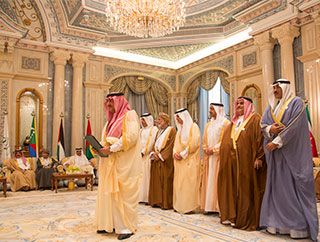
On May 21, 2017, a delegation of the Leaders of the Cooperation Council for the Arab States of the Gulf Countries presented an agreement of understanding to the U.S. Secretary of State Rex Tillerson. (Image courtesy of The White House on flickr. This image is in the public domain.)
Instructor(s)
Prof. Fotini Christia
Prof. Richard Nielsen
MIT Course Number
17.568
As Taught In
Spring 2017
Level
Graduate
Course Description
Course Features
Course Description
This course surveys both classic and cutting-edge work on the politics of the Middle East, broadly defined. Topics include the causes and consequences of political and economic development, authoritarianism and democratization, the influence of social movements, the role of women in Middle Eastern politics, regional inter-state relations, Islamism, terrorism, colonialism and foreign occupation, state-building, resistance and rebellion, and the Arab uprisings.


